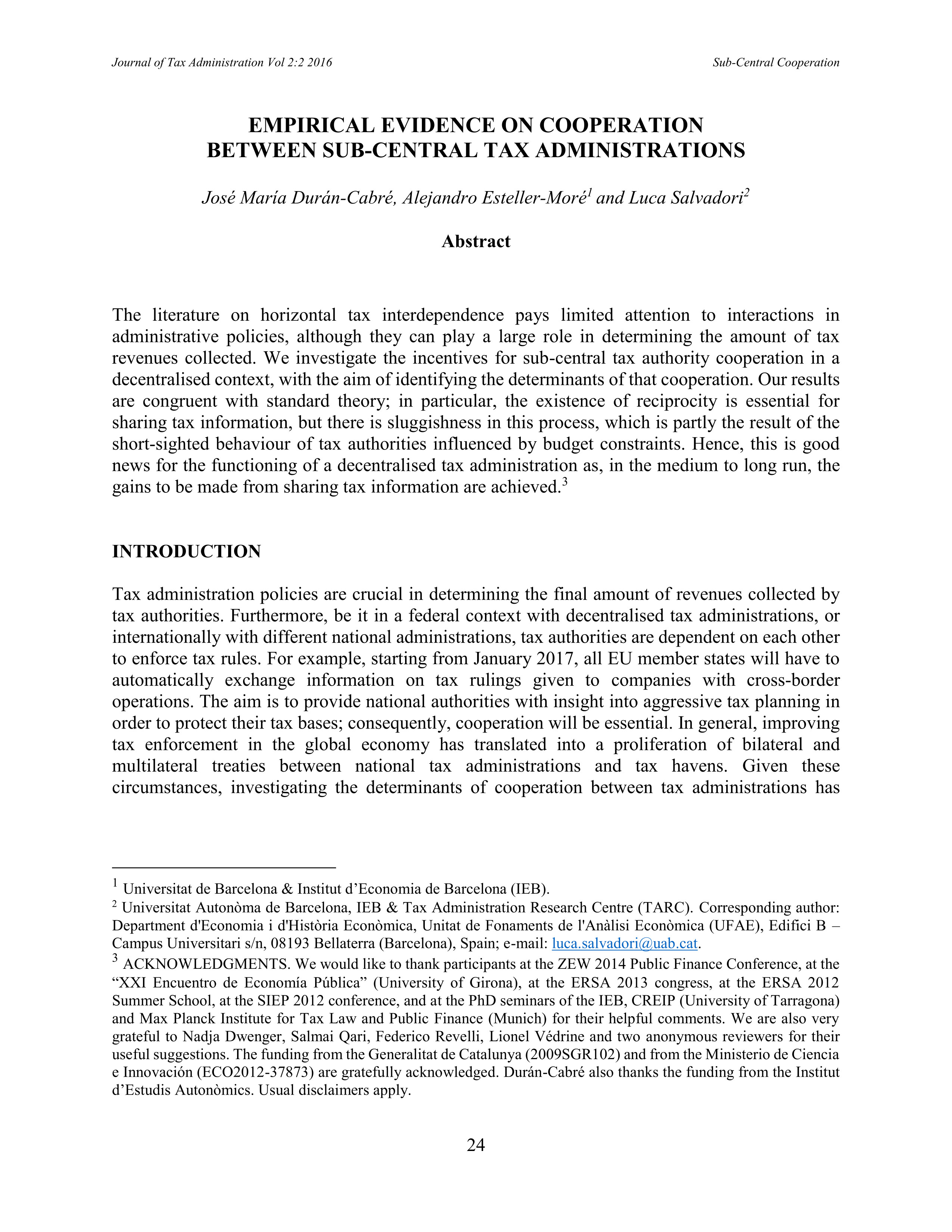Empirical Evidence on Cooperation Between Sub-Central Tax Administrations
Abstract
The literature on horizontal tax interdependence pays limited attention to interactions in administrative policies, although they can play a large role in determining the amount of tax revenues collected. We investigate the incentives for sub-central tax authority cooperation in a decentralised context, with the aim of identifying the determinants of that cooperation. Our results are congruent with standard theory; in particular, the existence of reciprocity is essential for sharing tax information, but there is sluggishness in this process, which is partly the result of the short-sighted behaviour of tax authorities influenced by budget constraints. Hence, this is good news for the functioning of a decentralised tax administration as, in the medium to long run, the gains to be made from sharing tax information are achieved.
References
Akay, A. (2009). The Wooldridge Method for the Initial Values Problem Is Simple: What About Performance? IZA DP No. 3943.
Bacchetta, P., & Espinosa, M. P. (1995). Information Sharing and Tax Competition Among Governments. Journal of International Economics, 39, 103–121.
Bacchetta, P., & Espinosa, M. P. (2000). Exchange-of-Information Clauses in International Tax Treaties. International Tax and Public Finance, 7, 275–293.
Bucovetsky, S. (1991). Asymmetric Tax Competition. Journal of Urban Economics, 30, 167-181.
Chisik, R., & Davies, R. B. (2004). Asymmetric FDI and tax-treaty bargaining: theory and evidence. Journal of Public Economics, 88, 1119-1148.
Cremer, H., & Gahvari, F. (2000). Tax evasion, fiscal competition and economic integration. European Economic Review, 44, 1633-1657.
Dreher, A., Gehring, K., Kotsogiannis, C., & Marchesi S. (2014). Information transmission within federal fiscal architectures: Theory and evidence. CESifo Working Paper No. 4400.
Durán-Cabré J. M., Esteller-Moré, A., & Salvadori, L. (2015). Empirical evidence on horizontal competition in tax enforcement. International Tax and Public Finance, 22(5), 834-860.
Esteller-Moré, A. (2005). Is There a Connection Between the Tax Administration and The Political Power? International Tax and Public Finance, 12, 639-63.
Esteller-Moré, A. (2008). Tax Administration in Spain: A Description and Analysis of the current institutional organization and some proposals of reform. In N. Bosch & J.M. Durán-Cabré (Eds.) Fiscal Federalism and Political Decentralization: Lessons from Spain, Germany and Canada, (pp. 209-247). Edward Elgar Publishing.
Esteller-Moré, A. (2011). Is the Tax Administration Just a Money Machine? Empirical Evidence on Redistributive Politics. Economics of Governance, 12, 275-299.
Elsayyad, M. (2012). Bargaining over tax information exchange. Max Planck Institute for Tax Law and Public Finance Working Paper No. 2012-02.
Heckman, J.J. (1981). The Incidental Parameters Problem and the Problem of Initial Conditions in Estimating a Discrete Time - Discrete Data Stochastic Process. In C. Manski and D. McFadden (Eds.) Structural Analysis of Discrete Panel Data with Econometric Applications (pp. 179-195). Cambridge, Mass: MIT Press.
Hyslop, D.R. (1999). State Dependence, Serial Correlation and Heterogeneity in Intertemporal Labor Force Participation of Married Women. Econometrica, 67, 1255-1294.
Honore, B. (2002). Nonlinear Models with Panel Data. Portuguese Economic Journal, 1, 163–179.
Huizinga H., & Nielsen, S.B., (2002). Withholding Taxes or Information Exchange: The Taxation of International Interest Flows. Journal of Public Economics, 87, 39–72.
Johannesen, N., & Zucman, G. (2014). The End of Bank Secrecy? An Evaluation of the G20 Tax Haven Crackdown. American Economic Journal: Economic Policy, 6 (1): 65-91.
Keen, M., & Ligthart, J.E. (2006a). Information sharing and international taxation: A primer. International Tax and Public Finance, 13, 81-110.
Keen, M., & Ligthart, J.E. (2006b). Incentives and Information Exchange in International Taxation, International Tax and Public Finance, 13, 163-180.
Ligthart J.E., & Voget, J. (2010). The determinants of Cross-Border Tax Information Sharing, mimeo.
Martinez-Vazquez, J., & Timofeev, A. (2010) Choosing between centralized and decentralized models of tax administration. International Journal of Public Administration, 33, 601-619.
Tanzi, V., & Zee, H.H. (2001). Can Information Exchange be Effective in Taxing Cross-Border Income Flows? In K. Andersson, P. Melz and C. Silfverberg (Eds.), Modern Issues in the Law of International Taxation (pp. 259-268). Stockholm: Kluwer Law International.
Wilson, J. (1991). Tax Competition with Interregional Differences in Factor Endowments. Regional Science and Urban Economics, 21, 423-451.
Wooldridge, J.M. (2002). Econometric Analysis of Cross Section and Panel Data. Cambridge, Mass: MIT Press.
Wooldridge, J.M. (2005). Simple solutions to the initial conditions problem in dynamic, nonlinear panel-data models with unobserved heterogeneity. Journal of Applied Econometrics, 20, 39-54.

Downloads
Published
How to Cite
Issue
Section
License
Copyright (c) 2016 José María Durán-Cabré, Alejandro Esteller-Moré, Luca Salvadori

This work is licensed under a Creative Commons Attribution 4.0 International License.
Our open access status means that authors retain the copyright of their work. However, all papers published in JOTA are done so under a Creative Commons Attribution 4.0 International license (CC BY). This means that others can share and/or adapt your work without your permission as long as they follow certain rules, including attributing your work correctly.
You can learn more about this on our Open Access, Licensing, and Copyright Policies page.



